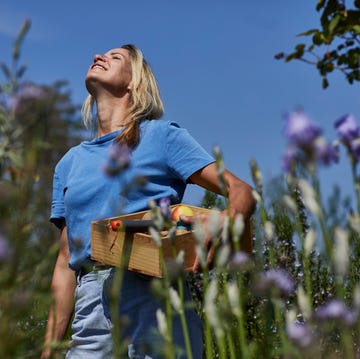The community centre doors open and I watch as familiar faces and a few new ones trickle into the FOOD (Food On Our Doorstep) Club. The weekly food boxes are all packed and lined up, ready to be collected. One of our regulars walks over and I ask how she’s doing, but she bursts into tears. We step into the kitchen for a chat over a hot drink, and 10 minutes later she’s back on her feet again. Her problems might not have been solved, but sometimes all people really need is to feel heard and valued. Our FOOD Club is more than just a collection point, it’s a community.
I began volunteering after being diagnosed with fibromyalgia in 2015, which can cause sensitivity to pain, fatigue, stiffness and brain fog, among other symptoms. Due to my illness, I eventually had to give up the teaching career I loved.
I began helping out at swimming clubs, reading groups and the Scouts, as they were more flexible than full-time teaching. I’d also been interested in volunteering at food banks because, despite my illness, I felt lucky in other ways. I didn’t have to worry about providing basic necessities for my family, for example, but I knew this wasn’t the case for everyone.
So, since 2020, I’ve been volunteering at the Family Action FOOD Club in Mansfield, which I now run. Each Thursday, we receive deliveries through a company that collects excess food from supermarkets such as Co-op, Tesco and Waitrose & Partners. Every delivery is different, with a range of fruit, vegetables, meat, yogurts, cheese and perhaps mashed potato or Indian snack selections. We sort all of the items into up to 40 boxes, providing a mix of fresh and tinned or longer-life food, which can work together as meals. We also cater for vegetarian and vegan diets with plant-based products, and run a shop selling extra items at low prices.
On Fridays at 10am, we open the doors for members to collect their weekly box, which costs them £3.50 to £4 but is worth about £10 to £15. Any locals who need support can sign up with a short form, telling us their details and any dietary requirements. We don’t ask questions or for proof of circumstances. Our members are people of all backgrounds: grandparents, teachers, pregnant mums, people with health difficulties, nurses. Some people come just the once or every now and then, while others are regulars we see weekly.
What I love most about volunteering at FOOD Club is the people I’ve met. I’ve got to know visitors’ faces and hear about their lives and families. I’ve seen mums I knew in early pregnancy come along with their toddlers, who I’ve watched grow up.
For some of our visitors, it might be the only time they’ve spoken to another person that week. Usually at the FOOD Club, we’ll have between two and four volunteers helping out. During the school holidays, my daughters, Simi, 12, and Kaia, 10, come along, too. Simi has Asperger’s syndrome and it’s been amazing to watch how she’s met people there and to see her striking up friendly conversations with members. She loves knowing she’s able to make a positive impact in someone’s day.
Volunteering has reminded me that everyone is dealing with their own problems, and many are struggling even more. It’s rewarding to be able to make people’s lives just that little bit easier through FOOD Club, and volunteering has helped me regain a sense of purpose in my own life, too.
How to volunteer
What is the FOOD Club?
FOOD Clubs provide low-cost food to those at risk of food insecurity. As they use surplus produce from supermarkets, the clubs (of which there are 40 in the UK) prevent food waste while creating a community space for members.
What often do I need to volunteer?
You could get involved for just four hours a week (ideally committing for at least six months), helping with deliveries, packing the food bags and chatting to members as you assist them on collection day.
What training will I receive?
There are three training sessions: Food Allergy Awareness, Manual Handling and Level 2 Food Safety and Hygiene training. You’ll also get plenty of practical training on site while you’re volunteering.
To apply, visit family-action.org.uk/volunteer














